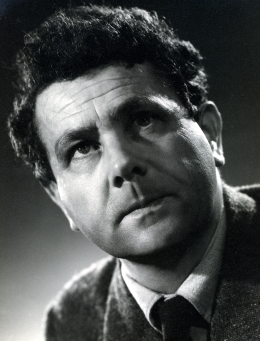
Gerald Raphael Finzi was a British composer. Finzi is best known as a choral composer, but also wrote in other genres. Large-scale compositions by Finzi include the cantata Dies natalis for solo voice and string orchestra, and his concertos for cello and clarinet.

A string orchestra is an orchestra consisting solely of a string section made up of the bowed strings used in Western Classical music. The instruments of such an orchestra are most often the following: the violin, which is divided into first and second violin players, the viola, the cello, and usually, but not always, the double bass.
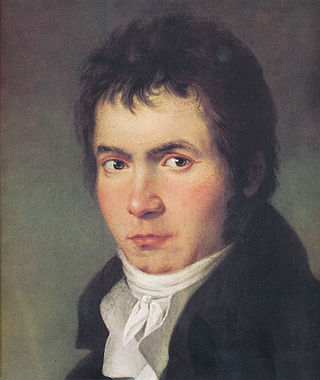
The Violin Concerto in D major, Op. 61, was written by Ludwig van Beethoven in 1806. Its first performance by Franz Clement was unsuccessful and for some decades the work languished in obscurity, until revived in 1844 by the then 12-year-old violinist Joseph Joachim with the orchestra of the London Philharmonic Society conducted by Felix Mendelssohn. Joachim would later claim it to be the "greatest" German violin concerto. Since then it has become one of the best-known and regularly performed violin concertos.

Jacqueline Mary du Pré was a British cellist. At a young age, she achieved enduring mainstream popularity. Despite her short career, she is regarded as one of the greatest cellists of all time.

The Brandenburg Concertos by Johann Sebastian Bach, are a collection of six instrumental works presented by Bach to Christian Ludwig, Margrave of Brandenburg-Schwedt, in 1721. The original French title is Six Concerts à plusieurs instruments, meaning "Six Concertos for several instruments". Some of them feature several solo instruments in combination. They are widely regarded as some of the best orchestral compositions of the Baroque era.

Léon Jean Goossens, CBE, FRCM was an English oboist.

Edward Elgar's Cello Concerto in E minor, Op. 85, his last notable work, is a cornerstone of the solo cello repertoire. Elgar composed it in the aftermath of the First World War, when his music had already gone out of fashion with the concert-going public. In contrast with Elgar's earlier Violin Concerto, which is lyrical and passionate, the Cello Concerto is for the most part contemplative and elegiac.
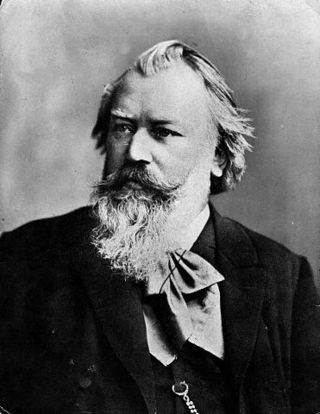
The Double Concerto in A minor, Op. 102, by Johannes Brahms is a concerto for violin, cello and orchestra. The orchestra consists of 2 flutes, 2 oboes, 2 clarinets, 2 bassoons, 4 horns, 2 trumpets, timpani and strings.
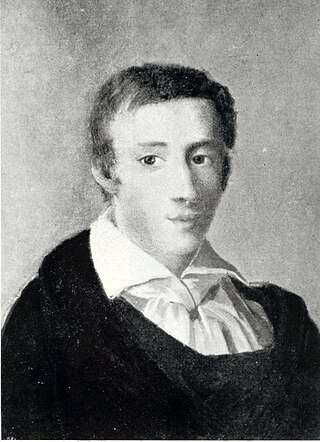
The Piano Concerto No. 2 in F minor, Op. 21, is a piano concerto composed by Frédéric Chopin in fall 1829. Chopin composed the piece before he had finished his formal education, at around 20 years of age. It was first performed on 17 March 1830, in Warsaw, Poland, with the composer as soloist. It was the second of his piano concertos to be published, and so was designated as "No. 2", even though it was written first.
Camille Saint-Saëns composed his Cello Concerto No. 1 in A minor, Op. 33, in 1872, when he was 37 years old. He wrote this work for the French cellist, viola da gamba player and instrument maker Auguste Tolbecque. Tolbecque was part of a distinguished family of musicians closely associated with the Société des Concerts du Conservatoire, France's leading concert society. The concerto was first performed on January 19, 1873, at the Paris Conservatoire concert with Tolbecque as soloist. This was considered a mark of Saint-Saëns' growing acceptance by the French musical establishment.
Violin Concerto No. 1 in F-sharp minor, Op. 14, by Polish violin virtuoso Henryk Wieniawski was first performed on October 27, 1853 in Leipzig. The score is dedicated to King Friedrich Wilhelm IV of Prussia.

Christopher Evelyn Bunting was an English cellist. He had an international reputation, and was a highly regarded teacher; he gave first performances of notable cello concertos.
Deshamanya Rohan de Saram is a British-born Sri Lankan cellist. Until his 30s, he made his name as a classical artist, but has since become renowned for his involvement in and advocacy of contemporary music. He travels widely and is much in demand for workshops and summer schools in addition to sustaining a schedule of adventurously programmed concerts.
Alfredo Campoli was an Italian-born British violinist, often known simply as Campoli. He was noted for the beauty of the tone he produced from the violin. Campoli spent his childhood and much of his career in England.

The Cello Sonata No. 2 in F major, Op. 99, was written by Johannes Brahms in 1886, more than twenty years after completing his Sonata No. 1. It was first published in 1887. It was written for, dedicated to and first performed by Robert Hausmann, who had popularised the First Sonata, and who would the following year be given the honour of premiering the Double Concerto in A minor with Joseph Joachim.

Kenneth Leighton was a British composer and pianist. His compositions include church and choral music, pieces for piano, organ, cello, oboe and other instruments, chamber music, concertos, symphonies, and an opera. He had various academic appointments in the Universities of Leeds, Oxford and, primarily, Edinburgh.
Edward Elgar's Cello Concerto received its first complete recording in 1928. A truncated version had been recorded under the composer's supervision, using the acoustic recording process, but it was not until the introduction of electrical recording in the mid-1920s that large orchestral works of this kind could be adequately put on disc. All the recordings up to 1963 were monaural. The first stereophonic studio recording, by Jacqueline du Pré, the London Symphony Orchestra and Sir John Barbirolli, has remained in the catalogues continuously since its first release, and is still used by many as a touchstone.

Music Room is an innovative British television music series that presents classical musicians and the pieces they play in a manner normally associated with popular music programming. Filmed in a bare studio with only a scaffold cube for a set, the programme strips away the glamour that often marks classical music as an elitist art form. The series has also been broadcast in Canada and across South America.
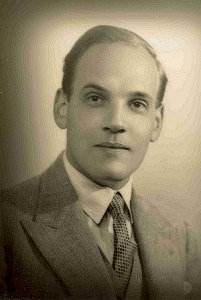
William Busch was a British composer and musician. Busch studied music in London, Berlin and the United States. His composition teachers included John Ireland and Bernard van Dieren. He worked as a concert pianist before devoting himself more to music composition. But his pacifism during World War II resulted in decreased reception for his works during this time.
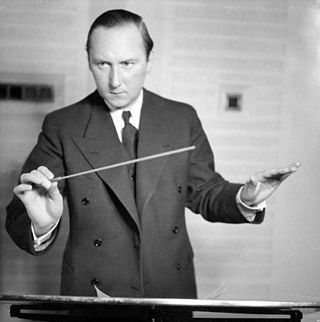
The Violin Concerto, Op. 54, is a three-movement concertante composition for violin and orchestra written in 1952 by the Swedish composer Lars-Erik Larsson. The piece premiered over Swedish Radio on 11 January 1953 in Stockholm, Sweden, with Sten Frykberg conducting the Swedish Radio Orchestra. The soloist was the Hungarian violinist André Gertler, its dedicatee.














